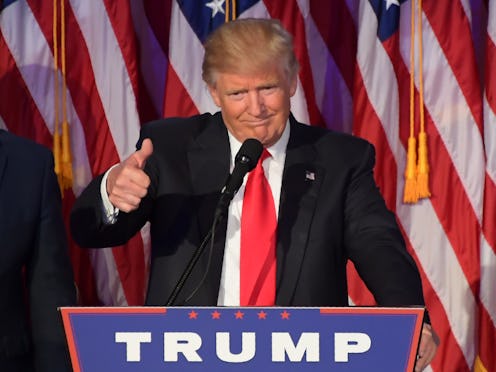News
Trump's Wall Isn't Going Up Just Yet
Upending the expectations of all manner of experts, Donald Trump was elected president. He comes in with a Republican Senate, a Republican House, and, with the seat left open on the Supreme Court, the potential to enact a wide-sweeping agenda. Considering how earth-shattering much of that agenda would be — repealing the Affordable Care Act, deporting millions of illegal immigrants, pulling the United States back from international agreements like NAFTA, NATO, and the Paris Climate Agreement, and building a wall on the US southern border — it's worth looking at how easily Trump would be able to enact it.
The president depends on Congress. This is especially true of domestic policy, with Congress controlling funding and passing laws. For much of Trump's agenda, he agrees with House Speaker Paul Ryan and Senate Majority Leader Mitch McConnell. So Trump's tax plan, cutting rates massively for top earners, would likely be mostly passed, since it coincides with Ryan's agenda of cutting taxes on the rich. Similarly, both he and Congressional Republicans have advocated repealing Obamacare.
However, the nature of Trump's win leaves some ambiguity. Trump reached victory through the support of working class white voters. And while these voters support both tax cuts and the repeal of Obamacare, it remains to be seen how happy they would be with a loss of government benefits that provide healthcare and many other things cut by the Ryan budget plan. Trump proved that working class white voters are angry, upset at being left behind, and he will likely need to help fix their lives in order to retain their support. Trump and Republicans will need to come up with a healthcare plan that insures those who weren't covered before Obamacare.
Perhaps the biggest tenet of Trump's domestic agenda was immigration. At different times during his presidential campaign, Trump has proclaimed that he aims to build a wall, deport millions of illegal immigrants, and ban Muslims form entering the country (which he somewhat moderated to "extreme vetting.")
The last of the above-mentioned policy is probably the hardest — it would bump into constitutionality challenges in the courts, though it could take years for it work its way up. Already, there's evidence that Republicans have backed off it. The first two have problems of feasibility — building a wall would be extremely expensive, as would mass deportation. Both would be among the most ambitious policies in modern American history, opposed by majorities of the country and even Republicans, according to Gallup. Trump would need to to find a way to convince Congress that it's worth pursuing the difficult path.
But perhaps the most uncertain part of Trump's agenda is foreign policy. The president has little constraints in negotiating treaties and exercising military force. Trump's desire to get much tougher on ISIS would have little to stop it. And he would have the ability to pull the United States out of the Paris Climate Agreement unilaterally —most Obama's climate policy was through executive action. In the event of an event that would invoke NATO's Article 5 — declaring an attack on one member an attack on all — Trump would be solely responsible for the response.
Trump's presidency is still over two months away. It's impossible to tell how much of his abrasive campaign will translate into an earth-shattering presidency. But it's clear that he has the potential to make big changes, or to leave the country much as it is.
